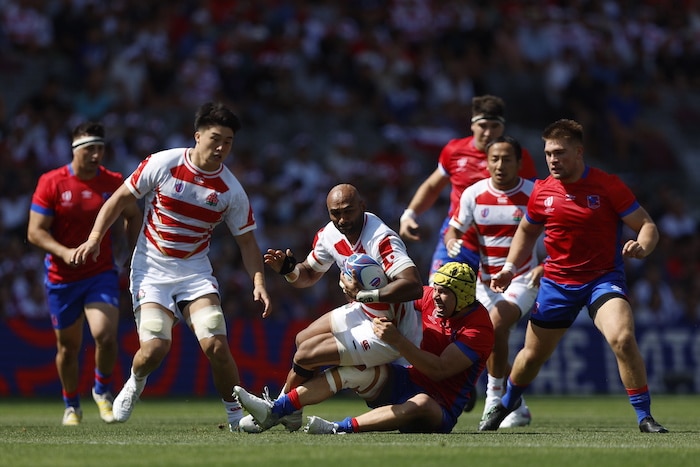Japan put on a dominant performance to defeat Chile 42-12 in their opening Rugby World Cup clash at the Stadium de Toulouse on Sunday.
Japan demonstrated a dominant performance in the Toulouse heat by effectively utilising their forward pack to overpower Chile and secure six tries, with the majority being scored by forwards. This impressive display followed an initial surprise lead by debutant fly-half Rodrigo Fernandez in the sixth minute.
In Tokyo four years ago, Kotaro Matsushima emerged as the hat-trick protagonist, leading the hosts to a 30-10 victory over the underdog team of Russia, marking the commencement of their tournament campaign.
In this instance, Matsushima’s involvement in ball possession was notably limited, as Japan’s forwards garnered the majority of attention and accolades. However, this occurred subsequent to Chile entertaining aspirations of achieving a momentous upset.
The South American players demonstrated an early inclination to launch offensive manoeuvres from various positions on the pitch, much to the satisfaction of the sizable audience. Consequently, they were duly compensated with goals at the commencement of both halves.
Chile successfully made their first touchdown at the World Cup after a duration of six minutes. However, they were subjected to a suspenseful period of video review following a nearly squandered four-on-one break.
The fullback, Inaki Ayarza, effectively penetrated Japan’s expansive defensive formation at the midpoint of the field. Subsequently, the scrum-half, Marcelo Torrealba, attempted an individual play but was dispossessed during the tackle, despite the presence of teammates on either side of him, fervently requesting a pass.
However, Fernandez, the individual who successfully scored the 2022 world try of the year, thereby securing Chile’s qualification for the World Cup, proceeded to advance with the ball and skillfully manoeuvred past the opposing team’s defensive line before ultimately grounding the ball.
Chile experienced a period of anxious anticipation until the video match officials officially verified that Torrealba did not commit a knock-on, resulting in the try being upheld. Santiago Videla successfully converted the try.
The potential danger posed by Chile diminished as the temperature in Toulouse rose to 32 degrees Celsius, while Japan’s forwards asserted dominance on the sun-drenched playing field.
Prior to the start of the match, Japan was compelled to make changes to their lineup.
The inability of Captain Kazuki Himeno to recover from a calf injury necessitated a positional change, whereby Jack Cornelsen transitioned from the second row to assume the role of No.8. Consequently, Amanaki Saumaki was enlisted to occupy the vacant position at lock.
Japan responded swiftly following the unexpected attempt. The robust and imposing player, Amato Fakatava, identified a significant opening in Chile’s defensive line and skillfully advanced from a distance of ten metres to score.
The momentum of the game shifted in favour of Japan following the issuance of a yellow card to Chilean prop Matias Dittus due to a late tackle at the 24th minute.
Japan made a strategic move towards the Chile goal line, initiating a five-metre scrum. Subsequently, centre Jone Naikabula effectively received a concise pass and forcefully penetrated through three opposing defenders, successfully manoeuvring his way over the goal line to score a try.
In the 36th minute of the match, Chile’s captain, Martin Sigren, was issued a yellow card for a high tackle, resulting in Chile playing with one less player for the remainder of the half.
In the given scenario, the Japanese team strategically opted for a corner play, subsequently resulting in Fakatava successfully breaching the opposition’s defence to secure a score via a lineout maul.
Rikiya Matsuda successfully executed his third conversion of the first half, resulting in Japan taking a commanding lead of 21-7 as the halftime interval commenced.
Chile emerged from the changing rooms with a revitalised sense of vigour.
Dylan Riley of Japan received a temporary suspension for intentionally knocking the ball forward, following which Ayarza once again exploited the defensive line, ultimately leading to Alfonso Escobar successfully crossing the try line.
Once again, Japan promptly reacted, effectively restricting Chile’s movement and successfully scoring as Michael Leitch, participating in his fourth World Cup, forcefully broke through two tackles and successfully grounded the ball between the goalposts.
Japan demonstrated a more robust performance in the latter stages as the central focal point. Ryoko Nakamura shifted her position and effectively immobilised Walter Dearns as he forcefully broke through a tightly formed group of players.
Matsuda successfully completed all six conversion attempts with utmost accuracy.
Photo by EPA/Guillaume Horcajuelo





